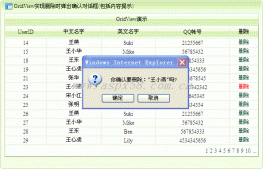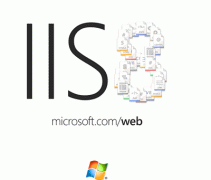本文以两种稍微有差别的方式用C#语言实现HTTP协议的服务器类,之所以写这些,也是为了自己能更深刻了解HTTP底层运作。
要完成高性能的Web服务功能,通常都是需要写入到服务,如IIS,Apache Tomcat,但是众所周知的Web服务器配置的复杂性,如果我们只是需要一些简单的功能,安装这些组件看起来就没多大必要。我们需要的是一个简单的HTTP类,可以很容易地嵌入到简单的Web请求的服务,加到自己的程序里。
实现方法一:
.net框架下有一个简单但很强大的类HttpListener。这个类几行代码就能完成一个简单的服务器功能。虽然以下内容在实际运行中几乎毫无价值,但是也不失为理解HTTP请求过程的细节原理的好途径。
复制代码代码如下:
HttpListener httpListener = new HttpListener();
httpListener.AuthenticationSchemes = AuthenticationSchemes.Anonymous;
httpListener.Prefixes.Add("http://localhost:8080/");
httpListener.Start();
new Thread(new ThreadStart(delegate
{
while (true)
{
HttpListenerContext httpListenerContext = httpListener.GetContext();
httpListenerContext.Response.StatusCode = 200;
using (StreamWriter writer = new StreamWriter(httpListenerContext.Response.OutputStream))
{
writer.WriteLine("<html><head><meta http-equiv=\"Content-Type\" content=\"text/html; charset=utf-8\"/><title>测试服务器</title></head><body>");
writer.WriteLine("<div style=\"height:20px;color:blue;text-align:center;\"><p> hello</p></div>");
writer.WriteLine("<ul>");
writer.WriteLine("</ul>");
writer.WriteLine("</body></html>");
}
}
})).Start();
如果你运用的好,举一反三的话,这样一个简单的类可能会收到意想不到的效果,但是由于HttpListener这个类对底层的完美封装,导致对协议的控制失去灵活性,因此我想大型服务器程序里肯定不会用这个类去实现。因此如果必要的话,自己用Tcp协议再去封装一个类,以便更好的控制服务运行状态。
实现方法二:
这个方法是一个老外分享的,虽然文件内容看起来很乱,其实逻辑很强很有条理。让我们来分析一下实现过程:
通过子类化HttpServer和两个抽象方法handlegetrequest和handlepostrequest提供实现…
复制代码代码如下:
public class MyHttpServer : HttpServer {
public MyHttpServer(int port)
: base(port) {
}
public override void handleGETRequest(HttpProcessor p) {
Console.WriteLine("request: {0}", p.http_url);
p.writeSuccess();
p.outputStream.WriteLine("<html><body><h1>test server</h1>");
p.outputStream.WriteLine("Current Time: " + DateTime.Now.ToString());
p.outputStream.WriteLine("url : {0}", p.http_url);
p.outputStream.WriteLine("<form method=post action=/form>");
p.outputStream.WriteLine("<input type=text name=foo value=foovalue>");
p.outputStream.WriteLine("<input type=submit name=bar value=barvalue>");
p.outputStream.WriteLine("</form>");
}
public override void handlePOSTRequest(HttpProcessor p, StreamReader inputData) {
Console.WriteLine("POST request: {0}", p.http_url);
string data = inputData.ReadToEnd();
p.outputStream.WriteLine("<html><body><h1>test server</h1>");
p.outputStream.WriteLine("<a href=/test>return</a><p>");
p.outputStream.WriteLine("postbody: <pre>{0}</pre>", data);
}
}
如果你能够顺利编译和运行附件中的项目,就你应该能够用Web浏览器输入Http://localhost:8080/,打开就可以看上面的简单的HTML页面渲染。让我们看看怎么具体是怎么实现的吧~!
这个简单的Web服务器可以分解为两个部分。HttpServer类开启了一个指定输入端口的TcpListener实例,使用accepttcpclient()用于循环处理传入的TCP连接请求。这是处理传入的TCP连接的第一步。当传入的请求到达已知的指定端口,这个接受过程会创建一个新的服务器与客户端端口配对,用于服务器语言客户端的连接通信。
复制代码代码如下:
View Code
public abstract class HttpServer {
protected int port;
TcpListener listener;
bool is_active = true;
public HttpServer(int port) {
this.port = port;
}
public void listen() {
listener = new TcpListener(port);
listener.Start();
while (is_active) {
TcpClient s = listener.AcceptTcpClient();
HttpProcessor processor = new HttpProcessor(s, this);
Thread thread = new Thread(new ThreadStart(processor.process));
thread.Start();
Thread.Sleep(1);
}
}
public abstract void handleGETRequest(HttpProcessor p);
public abstract void handlePOSTRequest(HttpProcessor p, StreamReader inputData);
}
这样一些介绍方式可能会让人产生一头雾水的感觉,或许直观地看代码或调试示例源代码程序可能会更容易理解一些。下面就把源码贴上来弓大家参考,希望能对大家有所帮助!
点击下载












